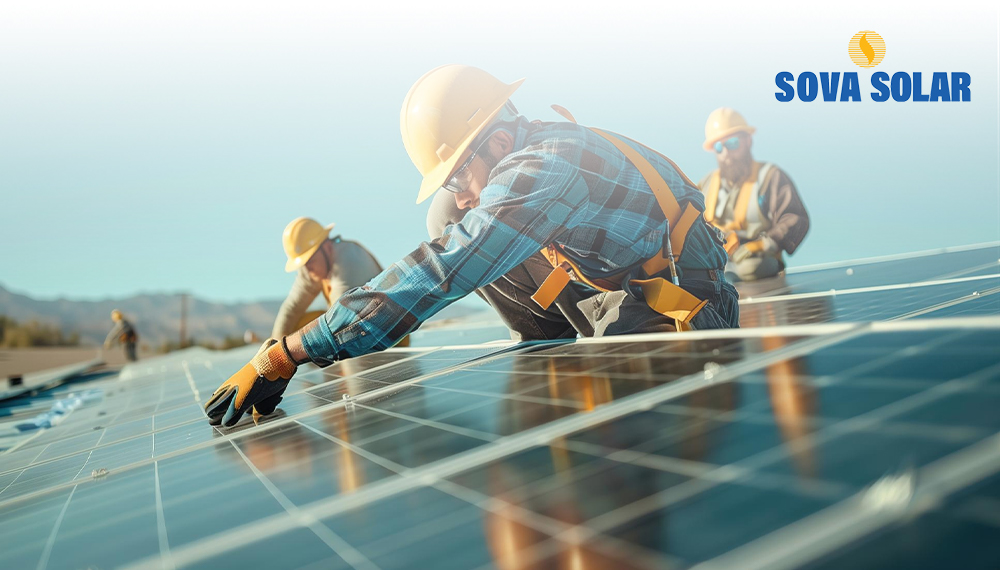
- sovasolar_admin
- Sep 9, 2024
- Uncategorized
- 0 Comments
The affordable accessibility of clean energy has driven the tones of solar panel users in many parts of India. Over the past few years, we have witnessed a notable expansion in the number of solar panel users. The Solar Quater has released a report that states that as of July 2024, India’s installed solar PV capacity has reached 87,207.97 MW. Thus, commercial or business sectors are adopting solar energy to move towards a sustainable future.
However, how effectively you utilize solar energy depends on your care and maintenance. Solar panels don’t demand a lot of sustentation, but some delicate functioning solar panels require timely removal of specks of dust and debris to improve their efficiency.
Today, we’ll discuss some maintenance tips and tricks that enable you to get the most value and productivity out of your panels.
6 Tips For Solar Panel Maintenance
1 Regular Cleaning
Why you need cleaning: Frequent cleaning is essential because debris such as leaves, dust, and bird droppings can collect on solar panels’ surfaces and reduce their effectiveness by obstructing sunlight.
Cleaning Procedure: Gently clean the panels with water and a gentle brush or towel. Steer clear of harsh chemicals and abrasive products since they might cause scratches on the surface or harm the protective layer.
Cleaning frequency: Cleaning frequency varies based on where you live. Cleaning may need to happen more frequently in regions that are dusty or polluted. Cleaning the panels is generally advised every three to six months.
2. Examine for Damage
Reasons for Its Significance: Due to their outdoor location, solar panels may be damaged by hail, fallen branches, or other disturbances. Even little chips or cracks might lower performance and possibly cause more serious issues.
What to Watch Out for: Check the panels’ surface frequently for any obvious damage indicators, such as chips, fractures, scratches, or discoloration. After severe weather occurrences such as storms, strong winds, or hail, pay close attention.
How to Examine: Use binoculars to do a visual assessment from the ground, or if the panels are easily accessible, examine them closely up close. Verify that every panel is firmly fixed and showing no symptoms of slipping or loosening.
3. Track System Efficiency
The Significance of Monitoring: To make sure your solar panel system is working well, check its energy output regularly. Monitoring enables you to take timely maintenance or repairs by warning you of possible problems before they become serious ones.
How to Keep an Eye on It: Make use of tools or software for tracking the efficiency of your solar panel system. Numerous solar inverters include built-in monitoring capabilities, and some systems provide convenient access through web portals or mobile apps.
What to Watch Out for: Observe the data on energy output on a daily, monthly, and annual basis. Examine the differences between the actual and predicted output depending on the system capacity, season, and weather.
4. Inverter inspection
The inverter’s role: An essential part of any solar panel system is the inverter, which changes the direct current (DC) the panels produce into the alternating current (AC) your house or place of business needs. Useful energy cannot be produced by your system if the inverter isn’t operating properly.
Visual Indicator: To indicate the operational status of an inverter, most of them come with an indicator light. A red or orange light could suggest an issue, but a green light usually indicates everything is operating as it should.
Frequent Inspections: Develop the practice of routinely checking the inverter’s display, particularly during inclement weather or if you observe a decrease in the energy output of your system.
5. Clean the Inverter Fan
Why It Matters: The inverter fan is essential for keeping the device cool and avoiding overheating. Over time, dust, dirt, and debris can build up, preventing airflow and leading to overheating in the inverter. This can lower efficiency or perhaps cause faults.
Methods for Cleaning:
Switch the Inverter Off: To guarantee safety, always separate the inverter from the power source and switch it off before cleaning.
Make Use of Compressed Air or a Soft Brush: Clean the fan and ventilation grilles gently with compressed air or a soft brush. Take care not to harm any internal parts.
Look for Debris: Examine the vicinity of the fan and clear away any gathered debris to make sure nothing is restricting the airflow.
6. Ascertain Adequate Ventilation
Why Air Quality Is Important: To release heat, solar panels require enough wind surrounding them. Since high temperatures can decrease voltage output and, eventually, energy production, overheating can degrade the efficiency of the panels.
Verify Installation: To allow air to flow underneath, panels should be installed with a space between them and the surface or roof. This distance aids in the panels’ natural cooling.
Examine the Ventilation Frequently: Check the area surrounding your solar panels regularly to make sure nothing is obstructing airflow. Verify that nothing is blocking the area beneath or surrounding the panels on ground-mounted systems, such as trees or other debris.
If you own solar panels from the Best Solar Panel Distributor, we advise you to maintain good ventilation, clean your panels regularly, inspect them for damage, and keep an eye on the operation of your system. You can make sure your solar panels are working as efficiently as possible and generating the most energy possible by paying attention to these pointers.






